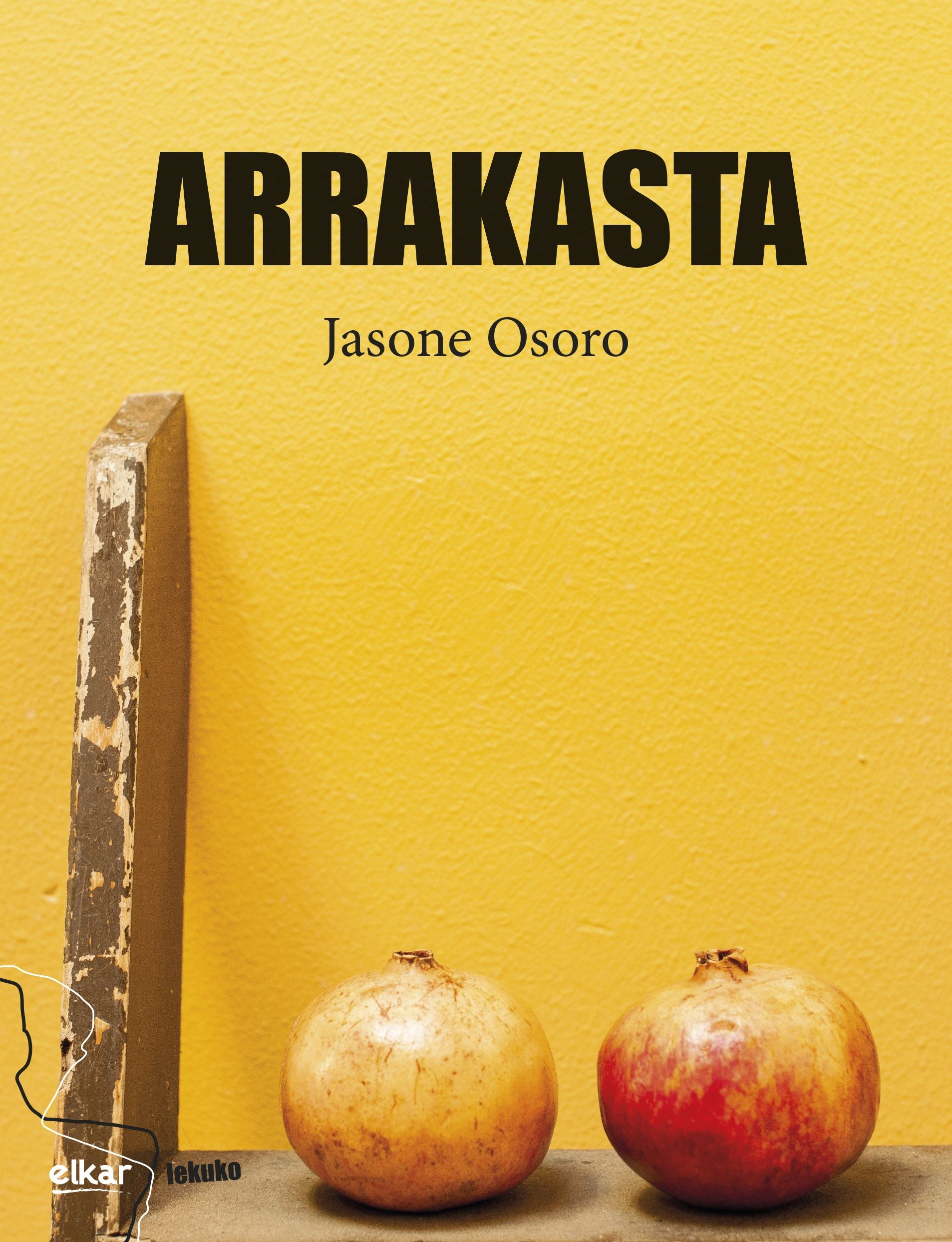Jasone Osoro: “Success is polysemous, malleable and achievable”
Euskaraz irakurri: Jasone Osoro: “Arrakasta polisemikoa da, malgua eta lorgarria”
“What is success?” From that question, the writer Jasone Osoro Igartua (Elgoibar, 1971) has constructed the essay Arrakasta (Elkar, 2023), and for this she has drawn, above all, from three sources: her own experiences accumulated in her prolific career as a writer, quotes and reflections on the subject from experts of all kinds (Friedrich Hegel, Uxue Alberdi, Epikuro , Christina Rosenvinge,
Osoro has interviewed the clown Joxe Mari Agirretxe Porrotx; the chef Eneko Atxa; the music Izaro Andrés; the writer Harkaitz Cano; the journalists Eva Domingo and Maider Egues; the filmmaker Jon Garaño; the actress, director, writer and cultural manager Aizpea Goenaga; former cyclist Markel Irizar; the actress Itziar Ituño; and the musician Gorka Urbizu to collect their impressions about success and talk, therefore, about alliances, criticism, ceilings, creativity and failure, among many other things.
We have tried to carry out a similar exercise, within our possibilities, with Osoro herself.
You have very recently received, in Azkoitia, the honorary award from the Geure Gelatik literary fair, which was also presented to you by Mariasun Landa. Zorionak! This is also a success, isn’t it?
Receiving recognition for the work done, and, furthermore, having it given to you by Mariasun Landa, means, of course, living a moment of success. Furthermore, I was accompanied by many people whom I love and who love me, and, for me, that is success.
At least, that’s how I experienced it: excited, nervous and exultant.
What is success and who can identify and judge it?
External success, that which is validated by the eyes of other people, is usually related to concrete achievements. I’m talking about an album or a book with great sales figures, earning a lot of money, having millions of followers on social networks, receiving Goya awards or Michelin stars, filling the Velodrome… The fact of having achieved any of those things automatically becomes the subjects of those actions successful in the eyes of others.
Internal success is related to well-being, to more personal achievements, to love, to being comfortable with yourself and with life. And that is only given by one’s own view, in no case by the external view.
I am very clear that achieving external success, the acceptance of others, does not have to make you happier; On the other hand, inner success will.
He prestige and the popularity (Izaro speaks in the book of success and fame) are two sides of the success. How do you think they are different?
I believe that work is essential to achieve success. Success can be a goal or, as Eneko Atxa says, the carrot for the donkey. In other cases, it can also be a consequence, as Gorka Urbizu understands it. In any case, in both meanings there is a dream, a vocation, a desire and, of course, effort to achieve it.
Fame and popularity can be achieved with little effort, by pure chance, thanks to the convergence of some specific factors at a given moment.
Izaro talks about prestige, which would be the value given to the work done, the good name, the quality. Delving into that, someone could achieve fame and popularity but not prestige. And vice versa: you can have prestige without being popular or known.
Success rests, according to the book, on self-knowledgethe alliances and the willpower. What characteristics does each of these concepts have?
Self-knowledge is essential. What is my dream? What are my strengths and weaknesses? What is it that hurts me? Where do I feel strong? To know where we want to go, we have to realize who we are and accept ourselves that way.
Secondly, there are alliances; that is to say, Who are my references and examples? What have I received at home? What have the teachers told me at school? Who are the people and friends I have around me? Who is by my side to offer me his hand if I fail? And to congratulate me when I win a prize? People are social beings, and, of course, we have to feel loved and loved. That also feeds our self-knowledge and our self-esteem. Alliances strengthen us.
Lastly, there is the will. I know what I am, what the alliances will be and the obstacles I will encounter along the way. Well, what do I do with all this?
This last point is very closely related to personality. It is as important to know what we want as it is to have the ambition to put it into action, to have the capacity to work, not to give up, to explore new paths. It is worthless to have talent and vocation if they are not accompanied by work and the capacity for sacrifice.

How does a creator manage the relationship between their effort and the reward for it, knowing that it is not always balanced or fair?
Gorka Urbizu says that a confident person is not a creator. That is to say, the creators live a permanent imposter syndrome. Therefore, as Cano says, either you are a samurai and you never expect anything or, if you receive some recognition, you do not believe that the successful moment you are experiencing is true or deserved. Besides, you know that all that means is that you have to continue working.
Still, one of the things that helps maintain that balance is the strength that comes with having an idea at a given moment. Aizpea talks about flash; Atxa says that when he has an idea he feels like “the fucking master”; Garaño also recognizes that it is a very, very special moment, a kind of emotion that is not repeated when it comes to launching that idea. That’s hooking: the idea itself and the ambition to develop it, despite being aware that what you will find along the way will not be what you expected.
Our cultural system and our market are limited, somewhat dystrophic in some aspects (Gorka Urbizu states in the book that it is an oxymoron to join the words Basque and mainstream). What consequences does all this have on our way of understanding success?
As Cano says, he can be someone more or less appreciated in Euskal Herria and, at the same time, a nobody outside of here. The fact of being a limited culture and market can be, at the same time, a ceiling and a springboard. Someone could say “you have readers because you write in Basque” in the same way that they could say “if you wrote or sang in another language other than Basque, your market would be broader.”
We are a people full of contradictions, and many times we place those who achieve success under suspicion, as if they do not really deserve it because there are other people who do it better than him or her and these have been treated unfairly.
The word success It is not, as Eneko Atxa states in the book, “politically correct.” In what aspect do you consider it problematic?
I have the feeling that the problem is that, in the same way that the external gaze is what gives a project its status as successful, that same gaze judges the subject. Look, recently a person who has read the book began to speak badly to me about some of the protagonists, recognizing that it was based on prejudices. Of course, who knows what they say about me.
The problem is that the market, the users, give someone the label of successful, and that ends up condemning that person, be it a writer, singer, actor, cook, journalist, athlete… And as it is painful, “I have been successful” is something that is always stated with a small mouth, in circles formed by allies and allies; Otherwise, there is a risk of showing yourself as arrogant and that from the outside, pride will be confused with cockiness; and nobody wants the pimps and the pimps.
I can be proud of you, of your work (says the user, the market), but you don’t show too much that you are proud of the work you have done.
Be that as it may, I think it is something general, not a trait of the Basques.

What is the flip side of success? What relationship do creators have with failure?
I would say that it is a relationship similar to the one maintained by people who are not creators, and the quality to manage that is part of each person’s personality. Failure can lead you to paralysis, to think that you will never achieve it; Or it can help you realize that you are not on the right path or that a specific peak is not within your reach.
Cano says that you never get what you want or what you have in your head, and that is, precisely, the fuel for the next objective. Jon Garaño has had many successes, but before each project the specter of failure appears. Does that paralyze you? No. Well, that’s the attitude, admitting the possibility of failure.
Success is, by definition, finite. What paths open from the peak of success? What is beyond success?
Success is polysemic, because it has many meanings; malleable, because it is changeable; and achievable, because each one has their own. And each of these sections permanently influences the next. That is, my dreams will change and adapt according to my abilities, my limits, my alliances and my ambitions.
Surely, I will not win the Nobel Prize, but I may manage to make a living from writing, or, at least, publish a book; and, if not, write stories for those around me.
Happiness is not found in conquering the highest peak. As Bunbury says, at 8000 meters there is no oxygen, and you drown. Isn’t it more comfortable to climb up to 3000 meters or take a walk along the seashore in noble company?
Do you have any other literary projects in hand?
I have a children’s book underway that I have been commissioned to do, and I have another idea floating around in my head, which I don’t know if it will finally materialize.
Source: Eitb
Bruce is a talented author and journalist with a passion for entertainment . He currently works as a writer at the 247 News Agency, where he has established himself as a respected voice in the industry.












